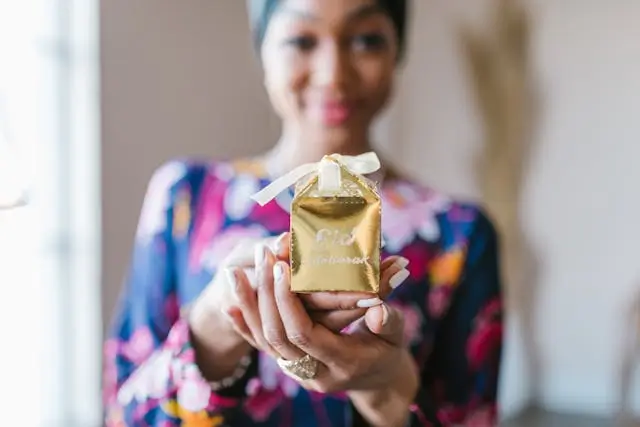Gifts in Islam – Sunnah, Benefits & Islamic Etiquette
Gift-giving is one of the simplest yet most powerful acts of love in Islam. Whether it’s a heartfelt note, a small box of dates, or a simple smile accompanied by a present, the Prophet Muhammad ﷺ taught that gifts carry spiritual value far greater than their material worth.
In a fast-paced world where love is often expressed through grand gestures, Islam reminds us that even a modest gift, given sincerely for the sake of Allah ﷻ, can soften hearts, strengthen bonds, and remove resentment.
Giving gifts in Islam is not a mere cultural tradition — it is a Sunnah deeply rooted in compassion, unity, and faith.
Prophet Muhammad ﷺ said:
“Exchange gifts, for it will remove hatred from your hearts.”
(Al-Adab al-Mufrad 594)

The Importance of Gifting in Islam
The Qur’an and Sunnah repeatedly emphasize generosity, gratitude, and good manners — and gift-giving combines all three. It is an act of kindness that reflects sincerity (niyyah), humility, and a desire to spread love among Muslims.
Gifting helps nurture relationships among family, friends, and neighbours, creating warmth within the Ummah. Even a small act — such as offering water, sharing food, or gifting a book — is beloved to Allah ﷻ when done with pure intention.
“You will not attain righteousness until you spend [in the way of Allah] from that which you love.”
(Qur’an 3:92)
A thoughtful gift is therefore a form of spending for the sake of Allah, strengthening the bond between giver and receiver, and earning reward in both worlds.
The Sunnah of Gift-Giving: The Example of the Prophet ﷺ
The Messenger of Allah ﷺ was the best example in all acts of kindness, and gift-giving was part of his daily life. He not only gave gifts but also happily accepted them, regardless of their value.
He gifted his companions, his wives, and even non-Muslims — teaching that generosity knows no boundary.
- The Prophet ﷺ would gift perfume, dates, and garments.
- He encouraged fairness when giving gifts to children.
- He reminded that gifts should be given for the sake of love, not expectation.
“Give gifts and you will love one another.”
(Al-Bukhari 2567)
By reviving this Sunnah, we revive a beautiful aspect of the Prophet’s mercy and manners.
The Spiritual and Social Benefits of Giving Gifts
Gift-giving carries countless benefits — spiritual, emotional, and social. It is not about luxury or price but about the intention behind it.
1. Strengthens Love and Brotherhood
Gifts dissolve envy and replace it with love and appreciation. They nurture family bonds, friendship, and marital harmony.
2. Removes Hatred and Resentment
The Prophet ﷺ linked gift-giving directly with removing hatred from the heart — a powerful spiritual remedy for jealousy and division.
3. Brings Barakah (Blessings)
When a Muslim gives sincerely, Allah ﷻ blesses both the giver and the receiver with peace and contentment.
4. A Form of Sadaqah
Though not obligatory like zakah, a sincere gift counts as a voluntary act of charity (sadaqah jariyah if it benefits others continuously).
5. Encourages Gratitude and Positivity
It reminds both hearts to be thankful — the giver for being able to give, and the receiver for being remembered.
📖 You can also inspire others through knowledge — explore our Online Quran Classes to gift yourself or a loved one a journey of spiritual learning.
Islamic Etiquette of Giving and Receiving Gifts
Gift-giving in Islam comes with beautiful adab (manners) that make the act more meaningful and rewardable.
1. Give with a Pure Intention (Niyyah)
Your goal should be to please Allah ﷻ and strengthen love — not to show off wealth or gain favour.
2. Choose Halal, Thoughtful Gifts
Avoid anything haram or harmful (like alcohol or impermissible images). Opt for useful, modest items — Islamic books, dates, clothing, or something beneficial to the recipient.
3. Present with Humility and Kindness
Smile, give with both hands, and say kind words. The Prophet ﷺ never belittled a gift — even if it was something small.
4. Accept Gifts Graciously
It’s Sunnah to accept gifts with gratitude and not to reject them without reason. Say “JazakAllahu khayran” and make dua for the giver.
5. Be Fair and Just
When gifting children, show fairness to avoid jealousy. Justice in affection is part of Islamic upbringing.
Whom and When to Give Gifts in Islam
Gift-giving in Islam is not restricted to Eid or birthdays. It can be practised any day, especially on occasions that bring joy and gratitude.
1. Whom to Gift
- Family: parents, spouses, children, relatives.
- Friends: to maintain love and connection.
- Neighbours: as Islam commands kindness to them.
- Non-Muslims: to display good manners and invite hearts towards Islam.
2. When to Gift
- Eid al-Fitr and Eid al-Adha.
- Upon returning from Hajj or Umrah.
- After childbirth or marriage.
- Visiting the sick or welcoming guests.
- Simply to express love — no occasion needed!
“Whoever believes in Allah and the Last Day, let him honour his guest.”
(Sahih Muslim 48)
Gift vs. Charity: Understanding Hadiyah and Sadaqah
Many people confuse gifts (hadiyah) with charity (sadaqah), but Islam beautifully distinguishes between them.
| Aspect | Gift (Hadiyah) | Charity (Sadaqah) |
|---|---|---|
| Purpose | Strengthen love and unity | Aid those in need |
| Recipient | Anyone | Poor or deserving |
| Reward | Builds affection | Earns Allah’s mercy |
| Example | Giving perfume, books, food | Donating money or food to needy |
Both are virtuous — but gifting builds social harmony, while charity removes economic hardship.
Common Mistakes to Avoid When Giving Gifts
While gifting is a Sunnah, a few common errors can reduce its reward:
- Showing off or expecting return gifts.
- Giving haram or inappropriate items.
- Being unfair among children or spouses.
- Neglecting intention (niyyah).
- Rejecting gifts out of pride.
Correcting these habits ensures the act remains purely for Allah’s pleasure.
Reviving the Sunnah of Gift-Giving in Modern Times
Today, Muslims around the world can revive this Sunnah in creative and meaningful ways.
- Gift Islamic books, prayer mats, digital Qur’an devices, or charity gift cards.
- Share small gifts during Jummah, weddings, and community gatherings.
- Support local halal businesses when purchasing gifts.
- Remember the Prophet ﷺ through every act of generosity.
For UK Muslims, gift-giving can also bridge cultures — showing neighbours and colleagues the beauty of Islam through kindness.
Even a cup of tea, a box of dates, or a heartfelt card can be a da’wah tool in itself.
Conclusion: Gifts That Please Allah and Unite Hearts
Gift-giving is more than a social nicety — it is a reflection of iman (faith), love, and brotherhood.
A sincere gift, no matter how small, can heal hearts, build friendships, and earn reward from Allah ﷻ.
Let us revive this blessed Sunnah of the Prophet ﷺ and fill our homes, families, and communities with generosity, gratitude, and affection.
“A gift given for the sake of Allah never decreases wealth — it only increases barakah.”
FAQs
What does Islam say about gift-giving?
Islam encourages gift-giving as a Sunnah that spreads love and removes hatred among believers.
Is giving gifts a Sunnah?
Yes. The Prophet ﷺ said, “Exchange gifts, for it removes hatred from your hearts.” (Al-Adab al-Mufrad 594)
Can Muslims give gifts to non-Muslims?
Yes, it is permissible when done respectfully and with good intention, as the Prophet ﷺ also gave gifts to non-Muslims.
What are the etiquettes of giving gifts in Islam?
Give with sincerity, choose halal gifts, present kindly, accept gratefully, and avoid showing off.
Is it haram to give gifts on birthdays in Islam?
It’s not encouraged, as celebrating birthdays has no basis in Islam and may resemble non-Islamic traditions.
How to thank someone for a gift in Islam?
Say “JazakAllahu Khayran” (May Allah reward you with goodness) — it’s the best way to show gratitude in Islam.






